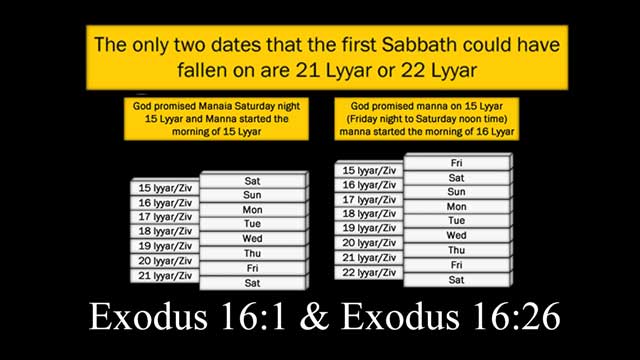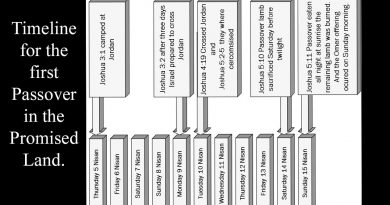First Sabbath Triangulation
Israel’s first Sabbath is marked by the end of the first week of manna. God gave Israel manna for six mornings, and on the seventh morning, being the Sabbath, the manna was not sent. Two key date references will allow us to identify the date of the first Sabbath.
The first key date is the day that manna was promised:
Exodus 16:1 – Israel came unto the wilderness of Sin, which is between Elim and Sinai, on the fifteenth day of the second month after their departing out of the land of Egypt.
The second date is how long the manna fell:
Exodus 16:26 – Six days ye shall gather it; but on the seventh day is the Sabbath, in it there shall be none.
The verses tell us that on 15 Ziv, manna was promised to Israel. The manna fell for six mornings, and on the seventh morning, being the Sabbath, no manna fell.
The main difficulty with following the timeframes is that we try to apply our definition of “day” to ancient Israel’s. Today, we start and end the day when we are sleeping. From the time we wake up to the time we go to sleep, it is the same day. Israel ended and began its day when they are awake. Israel’s days ended at sunset at twilight, and the new day began just after sunset. The result of starting a new day at different hours causes confusion. One example is that we do not know if the manna was promised in the evening or the morning or if it first fell on the morning of 15 Ziv or 16 Ziv.
The most natural way for us to read the statement would be that God promised manna on the 15 Ziv, and it began to fall on the 16 Ziv. However, we must remember that the day began and ended differently for Israel than for us. Israel’s day began at sunset and ended at sunset; if the manna was promised on the fifteenth, then the promise was made anywhere from Friday night to Saturday evening before sunset. If true, then Israel would have received the first manna on Sunday morning.
The second way to look at this would be that manna was promised on Saturday evening, 15 Ziv, then on the morning of Sunday, 15 Ziv, the first manna began to fall.
The manna fell for six mornings in a row, but on the seventh morning, no manna would fall. The 7th day would be a Sabbath, hence Saturday morning. This means that Friday morning would be the sixth morning in a row.
Two templates can be compiled from these criteria:
Template One:
- Manna was promised on 15 Ziv either on Friday evening or Saturday morning.
- The manna fell on the mornings of Sunday, 16 Ziv, Monday, 17 Ziv, Tuesday, 18 Ziv, Wednesday, 19 Ziv, Thursday, 20 Ziv, and Friday, 21 Ziv, but on Saturday, 22 Ziv, manna did not fall.
Template Two:
- Manna was promised on Saturday, 15 Ziv, after sunset.
- The manna fell on the mornings of Sunday 15 Ziv, Monday 16 Ziv, Tuesday, 17 Ziv, Wednesday, 18 Ziv, Thursday, 19 Ziv, and Friday, 20 Ziv, but on Saturday, 21 Ziv, manna did not fall.
These days of week templates can be used to compare proposed Exodus dates, and the correct one will line up with one of the two proposed templates. If it does not line up, it is not the correct Exodus date.
The first method has Friday evening and a Saturday morning as the time when manna was promised. The first manna would then fall the next morning on Sunday, 16 Ziv.
The second method would involve the promise in the evening and the manna in the morning happening on the same day, 15 Ziv. Occurring after twilight on the fifteenth day of the second month, Moses promised Israel that God would provide them food. It is worth noting that this method of calculating the first Sabbath is embraced by Josephus, the historian from Jesus’ time. Josephus gives us his belief in the timing of the events in question:
So Moses placed himself in the midst of them, and told them he came to bring them from God a deliverance from their present distresses. Accordingly a little after came a vast number of quails, which is a bird more plentiful in this Arabian Gulf than anywhere else, flying over the sea, and hovered over them, till wearied with their laborious flight, and, indeed, as usual, flying very near to the earth, they fell down upon the Hebrews, who caught them, and satisfied their hunger with them, and supposed that this was the method whereby God meant to supply them with food. Upon which Moses returned thanks to God for affording them his assistance so suddenly, and sooner than he had promised them.
But presently after this first supply of food, he sent them a second; for as Moses was lifting up his hands in prayer, a dew fell down; and Moses, when he found it stick to his hands, supposed this was also come for food from God to them: he tasted it; and perceiving that the people knew not what it was, and thought it snowed, and that it was what usually fell at that time of the year, he informed them that this dew did not fall from heaven after the manner they imagined, but came for their preservation and sustenance. So he tasted it, and gave them some of it, that they might be satisfied about what he told them. They also imitated their conductor, and were pleased with the food, for it was like honey in sweetness and pleasant taste, but like in its body to bdellium, one of the sweet spices, and in bigness equal to coriander seed. And very earnest they were in gathering it; but they were enjoined to gather it equally; the measure of an omer for each one every day, because this food should not come in too small a quantity, lest the weaker might not be able to get their share, by reason of the overbearing of the strong in collecting it. However, these strong men, when they had gathered more than the measure appointed for them, had no more than others, but only tired themselves more in gathering it, for they found no more than an omer a-piece; and the advantage they got by what was superfluous was none at all, it corrupting, both by the worms breeding in it, and by its bitterness. So divine and wonderful a food was this! It also supplied the want of other sorts of food to those that fed on it; and even now, in all that place, this manna comes down in rain, according to what Moses then obtained of God, to send it to the people for their sustenance. Now the Hebrews call this food manna; for the particle man, in our language, is the asking of a question. What is this? So the Hebrews were very joyful at what was sent them from heaven. Now they made use of this food for forty years, or as long as they were in the wilderness.[1]
Josephus believed it was in the evening when the tribe of Israel approached Moses, and God provided an immediate response. Josephus believed that quail fell from the sky immediately that evening, followed by manna appearing immediately the same evening after the quail. While the Bible does not highlight the timeframe for these events, this representation could have happened.
Moses approached Israel on 15 Ziv; what is unknown is if this was a Saturday daytime or a Saturday evening event. Seeing that Saturday daytime is a different Jewish day from Saturday evening, both options must be taken as possible candidates to be sure to encompass the correct date for the first Sabbath.
The odds of either of the two templets lining up to any year are 2 out of 7—since every seven years, two years would line up with this account.
[1] Josephus, Translated by Whiston, The Works of Flavius Josephus: Antiquities of the Jews (London: John Bumpus, 1828), 3.1.5-6, p. 81.


